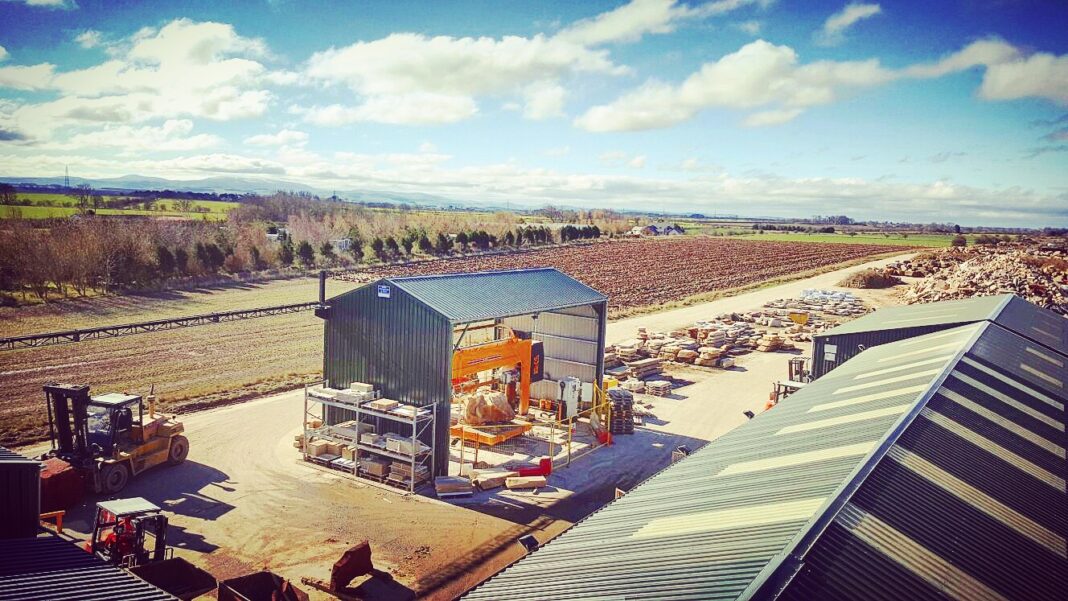
A quarry boss has spoken of the challenges of managing cash flow once the lockdown period ends in Scotland.
Marcus Paine, who has spent 26 years building up Hutton Stone in the Scottish Borders, fears uncertainty over cash flow could pose difficulties for many SMEs.
His business supplies natural and sustainable sandstone masonry to the new build and restoration construction sectors. Like many firms, Marcus was forced to furlough staff and rely on government grants when lockdown happened in March.
“With 40 staff we are no by no means a big business, but nevertheless we are a significant employer in a rural area and the concerning thing for me and those like me is how we’re going to be able to finance things once we get back to work.
“When we restart, let’s say for example on 1 June, we’ll instantly see our fixed overhead shoot up to £125,000 a month, of which £85,000 represents our wage bill, plus HP, finance and ancillary costs of around £40,000. We’d then expect to cut and supply stone for a month and invoice our customers at the month-end. And if our customers are good payers, we would expect a payment from them at the end of the following month, so with luck the beginning of i.e. August.
“However, that means we would have incurred at least £250,000 worth of costs before our best payers might pay – and some of them might well be in difficulty, which could start to offset our expenditure further. Given that early paying customers have always been harder to find in the construction sector, I can easily imagine a further month of delays in payment, taking us to £370,000 of incurred costs – and by this time we would most definitely have also begun incurring additional quarrying costs, consumable costs, bulk fuel costs, explosives costs, block purchase costs and more.
“That is a huge sum for any SME to finance in working capital and provides a sense of the level of focus we will need to apply to the issue of restarting carefully and with great caution.”
Marcus, who is president of CICV Forum member The Stone Federation (GB) is not confident that banks will ‘do their bit’ to support a local businesses. He added, “Government support has been immense, but the banks have been very slow to the table for SMEs like us. The vast majority of SMEs take considered and careful risks every day when we run our companies, borne out by determination to succeed and create secure, thriving businesses that will last. However, the banks have said they are ‘risk-averse’ which is dismal; the banks were saved by the UK taxpayers in 2008 and there are now lots of frightened owners of longstanding decent SMEs out there who believed that in this unprecedented situation they might be able to share their risks with the banks.
“Like me, they have been in business for many years and have behaved responsibly throughout, honouring contracts, looking after their staff and paying their taxes. Now banks are asking for one year of cash flow and clear detail of how we SMEs can trade out of the current crisis – in a situation where no one knows what the cash position will be next month, far less in 12 months’ time.”
Marcus said the initial lack of clarity from government was disappointing – but that has subsequently changed.
He explained, “Throughout this entire episode, clarity and a clear lead from both the UK and Scottish Governments was vital. For a while there were no definitive answers on anything and there was quite a bit of uncertainty over the furlough situation. Initially, we thought we could work, since ours isn’t a business that can be operated from home. However, as conflicting political views emerged, most of our customers took the view that the moral thing was to stop operations, and given none of our supplies were to essential projects at the time, we decided to do the same.
“We currently have 38 colleagues who are being supported by the furlough scheme, and the arrangements have been very helpful, as has our ability to take up finance and HP holidays. I also spoke to our MSP, Rachel Hamilton, who was extremely helpful in giving us good advice and, to her credit, Nicola Sturgeon has also been very clear. The only thing to note is that here in the Borders the differing political messages across the UK could not be more acutely felt.
“With the help of furlough and the HP holiday, we can now run the business for around £10,600 a month, which means our business and loyal staff are secure at this point. The wording of the Scottish Government’s rates relief package initially excluded us, but subsequent changes to the wording seem to suggest that we now may fit the modified criteria which would be very helpful. The only thing I’m not so sure about is deferring PAYE and VAT payments to HMRC – it’s a red herring and seems potentially suicidal. Much better to keep paying it now if you can, rather than being faced with big debts in March next year.”
Looking to the future, Marcus revealed there is a large element of unknown. “We’re just ordinary working people like anyone else, with mortgages and families to bring up. But at the moment, I just can’t tell what the future holds. What I do know is that it’s vital for all of us – SMEs, bosses, staff, banks and governments alike – to do our bit in the safe, steady and secure recovery of our economy, and shoulder the risk and responsibility together.”








